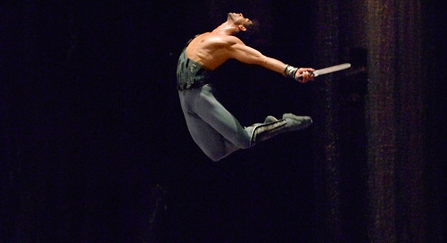Royal Albert Hall hosts a very special event – the first in a week of farewell performances for one of ballet’s biggest stars. Not a farewell to dance entirely, but his farewell to classical ballet. The dancer in question is Cuban Carlos Acosta; the programme a series of Pas de Deux and solos chosen to celebrate some of his memorable roles and his remarkable technique. The programme also highlights notable dance talent from Cuba. Acosta is accompanied by a full orchestra, choir, solo singers and eight principal dancers, mainly drawn from the Royal Ballet.

The evening begins with a delicate, dreamy piano solo, played by Robert Clark. Acosta appeared during this, sits down on a chair in a spotlight and unassumingly prepares for the Farewell Pas de Deux from Winter Dreams (music by Tchaikovsky, choreography by Kenneth MacMillan). Acosta is perfectly partnered by Marianela Nuñez here and throughout the evening (especially in the beautiful Balanchine Pas de Deux from Apollo). Other partnerships in the first half of the evening are not always so harmonious – Valentino Zuchetti‘s handling of Yuhui Choe in the Rhapsody Pas de Deux of Frederick Ashton shows an awkward touch and although the Manon Pas de Deux (danced by Laura Morera and Ryoichi Hirano) is heartfelt, Hirano has a wooden expression on his face and lacks the fluid grace of Acosta.
Sarah Lamb followed the MacMillan with an exquisitely danced Dying Swan – then the intertwining bodies in the Scheherazade Pas de Deux (Gabriela Lugo and Luis Valle) suggests what takes place on many of the thousand and one nights narrated by the heroine, bringing a playful dynamic to the stage. The first part of the evening finishes with one of Acosta’s favourite ballets – Don Quixote. Acosta and Nuñez raise the roof with their deft execution of multiple pirouettes in Kitri and Basilio’s Pas de Deux choreographed by Marius Petipa.
In stark contrast, the second part of the performance begins with the final Pas de Deux from MacMillan’s Mayerling. This darkly disturbing piece (the mood broken only by a jaunty comic turn from Valentino Zuchetti) shows Acosta’s ability with more serious subject matter – the bass-drum heartbeat is a particularly terrifying moment in the lead-up to the onstage suicide.
Two more pieces choreographed by MacMillan follow; a nice pairing of music by Francis Poulenc (the Gloria – music firmly bedded in the tormented world of his opera “The Dialogues of the Carmelites”) and Gabriel Fauré (the Requiem – leaving behind torment for a more serene spiritual place).
Anadramous, choreographed by Cuban Raúl Reinoso, is an exciting combination of inventive choreography, aquatic lighting (matching the liquid melancholy of Yann Tiersen’s music) and a change of gear from the recorded Tiersen soundtrack to live music with a trio composed by Ezio Bosso (violin, cello and piano). A visceral, visually ecstatic piece, and a highlight of the evening from dancers Gabrielle Lugo and Luis Valle (both Cuban).
The final piece, Memoria, (choreographed by Cuban Miguel Altunaga) has Acosta (like a martial-artist) poised and playing in and around a powerful circle of light on the floor of stage. Inspired by street dance, with an electronic soundtrack, there is a magical sense of precision to this dance, before Acosta leaves the circle of light completely (one final dance in the limelight?) and returns to the same chair which began the show. Removing his ballet shoes, he leaves them wistfully on the chair as he exits the stage.
It is easy to see (on the strength of this performance alone) why Acosta is a star – he radiates boyish charm, he is crisply in time with each gesture in the music, he is sincere in what he is doing, his range of expression is expansive and the sense that he is enjoying what he is doing translates directly to the audience. Acosta plans to continue with contemporary dance, while creating opportunities for under-privileged Cuban dancers with The Carlos Acosta International Dance Foundation. All strength to his arm. 5/5
Review written by Andrew Godbold.
Carlos Acosta, The Classical Farewell was shown at the Royal Albert Hall from Monday 3rd until Friday 7th October. For more information on the The Carlos Acosta International Dance Foundation, visit here…


Leave a Comment